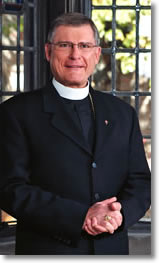by Rev. Jerry Kieschnick
 |
|
Rev. Dr. Gerald B. Kieschnick |
Do you think people 2,000 years ago were different from us?
The times were different, of course. Living standards were different. The issues in society facing the average person were different. And yet, people then, as now, needed food, clothing, and shelter. They lived in families and had friends and neighbors. They had fears and anxieties. And, they wanted security and peace.
Cultures and language differ, but people at their core are people, regardless of when and where they live (or lived).
As we approach the Christmas season, most of us look forward to the traditional reading of that beautiful account of the first Christmas in Luke 2. But months before angels appeared to shepherds saying, “Glory to God in the highest” (Luke 2:14), there were other words of joy and praise that ought not be overlooked.
These are the words of the priest Zechariah following the birth of his son, John, known broadly in the Christian faith as John the Baptist. They are recorded by Luke in the first chapter of his gospel:
“Blessed be the Lord God of Israel, for He has visited and redeemed His people and has raised up a horn of salvation for us in the house of His servant David, as He spoke by the mouth of His holy prophets from of old, that we should be saved from our enemies and from the hand of all who hate us; to show the mercy promised to our fathers and to remember His holy covenant, the oath that He swore to our father Abraham, to grant us that we, being delivered from the hand of our enemies, might serve Him without fear, in holiness and righteousness before Him all our days.
“And you, child, will be called the prophet of the Most High; for you will go before the Lord to prepare His ways, to give knowledge of salvation to His people in the forgiveness of their sins, because of the tender mercy of our God, whereby the sunrise shall visit us from on high to give light to those who sit in darkness and in the shadow of death, to guide our feet into the way of peace” (Luke 1:68–79).
We continue to sing these words still today as part of our liturgy. Zechariah’s song is known as the “Benedictus,” the Latin translation of the song’s first word, “blessed.” Zechariah sings powerful words about the fulfillment of God’s promise of a Savior, the yet-unborn Son of his wife’s young relative, Mary.
Zechariah is excited, and with good reason. He knows that the One who has the power and strength to save—this is the meaning of “horn” of salvation—is coming. He would rescue God’s people from oppression and deliver them from their sin.
Referring to Christ Jesus as “the sunrise,” Zechariah says that He will “give light to those who sit in darkness and in the shadow of death, to guide our feet into the way of peace.” Another translation says that this “rising sun” will “shine on those living in darkness. . . .”
The world is a dark place. Think of all the concerns people face today. Some items on the list have become all too familiar: economic uncertainty, war, and terrorism, to name just a few.
People recognize that the times in which we live are tenuous and uncertain. They have inflicted pain on many people—for example, through unemployment or the death of loved ones in Iraq or Afghanistan. We hear and read news reports of children being abducted and of gunmen killing innocent people. Fear, anxiety, and loss are very real.
We live in the shadow of death. We fall on our knees and pray to the One about whom Zechariah prophesied and sang.
Jesus came to bring sunshine to a dark world. What a great picture! Shine on us, O Lord!
My dear wife, Terry, and I pray that your Advent and Christmas will be greatly blessed with the sunshine that the Holy Infant brings and that you will know the peace that only He can give!
Lives Transformed through Christ, in Time . . . for Eternity!
e-mail: president@lcms.org
Web page: www.lcms.org/president




